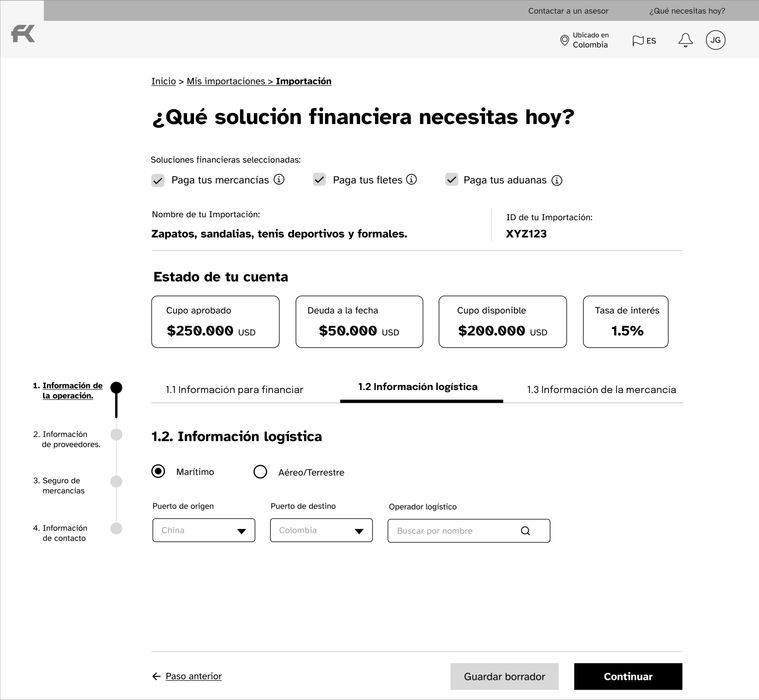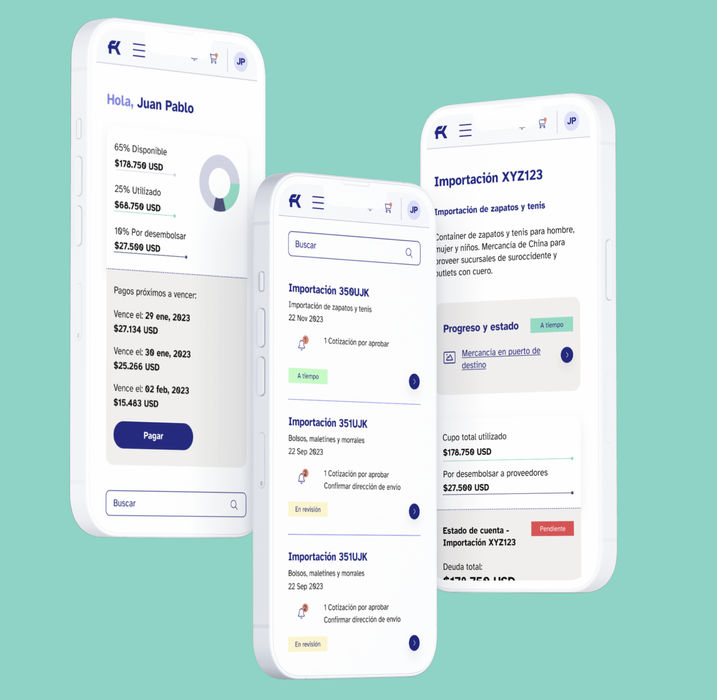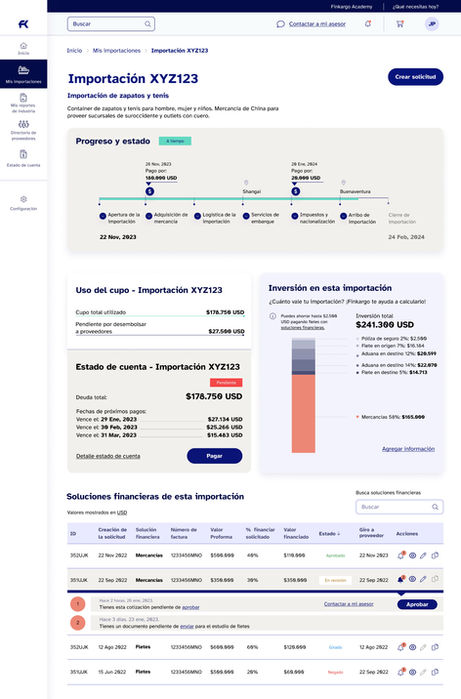Designing a SaaS Platform for Cross-Border Trade
Service
UX Consultancy, Service Design
Client
Finkargo
Agency
Usaria, 2024
Agency
Usaria, 2024
Client
Finkargo
Service
UX Consultancy, Service Design
Finkargo is a fintech company supporting Latin American SMEs with trade financing and logistics services. In 2024, the company aimed to expand its service portfolio through a SaaS product, enabling exporters to independently manage their operations across Colombia and Mexico.
The Challenge
Understand the specific needs of the Mexican and Colombian export markets to optimize the existing financing service, while identifying new opportunities that foster innovation and expand the product offering.
Research revealed major differences in financing conditions, operational workflows, and client expectations across both countries. These insights prompted the need to tailor Finkargo’s current service offering and explore additional tools that could increase efficiency, visibility, and adoption.
As Senior UX Consultant, I led this end-to-end project—from defining the research strategy and guiding its execution, to synthesizing insights and delivering high-fidelity prototypes for the new platform.
Since the SaaS product didn’t yet exist, I also directed and facilitated co-creation sessions with the client to help shape a product vision grounded in both business goals and user expectations. This effort aimed to validate the concept with current and prospective clients across both Colombia and Mexico.
Timeline
6 weeks (discovery → research → ideation → prototyping → validation)
Research statement and goals
To define a SaaS experience that:
→ Supports exporters’ operational independence.
→ Diversifies Finkargo’s service portfolio.
→ Reduces onboarding and support complexity.
Success criteria
MVP features validated by target users.
Clarity on priority flows and operational needs.
Alignment between product vision and regional user contexts.
Research methodology
Internal stakeholder interviews
Desk research
Semi-structured interviews with 12 exporters (Colombia & Mexico)
Co-creation workshops
Prototyping and usability testing with 6 users
Recruitment criteria and process
We targeted logistics and operations leads in SMEs already using or considering Finkargo services. We ensured diversity in terms of industry, digital maturity, and operational roles.
Sharing and activation
Insights were consolidated and activated in co-creation workshops with the product and business teams. We aligned around product direction using prioritized feature maps and interactive wireframes for validation and planning.
Approach
Outputs & deliverables
SaaS MVP scope with prioritized modules
Personas and customer journey flows
Interactive wireframes for validation
Feature prioritization matrix
O3
Portfolio diversification based on real user needs
Exporters consistently requested support beyond financing—such as advisory on documentation, shipment visibility, and real-time updates. These needs drove the design of a diversified platform positioning Finkargo as a full-service export partner.
O2
Opportunity to scale through SaaS innovation
The research showed a gap between Finkargo’s existing model and exporters’ end-to-end operational needs. A SaaS product could help scale the business by combining financing with shipment tracking, compliance tools, and supplier coordination.
O1
Local adaptation of the financial product
There were significant differences between the Colombian and Mexican markets in terms of financing processes, client expectations, and terminology. This led to the need to localize Finkargo’s offer—tailoring onboarding, support, and requirements by country.
Key findings
Business Value
Impact
The proposed platform reduced onboarding time by 30% for Mexican exporters in pilot testing and unlocked a new business line for Finkargo. By expanding beyond financing into operational support, the company increased average revenue per customer and strengthened client retention through a more comprehensive service.
Reflections
This project validated how UX research can expand product strategy—not just improve usability. Early involvement of stakeholders through co-creation allowed us to accelerate decision-making and align user needs with business capabilities. Designing for operational independence proved especially impactful in emerging markets, where exporters face fragmented and manual workflows.








